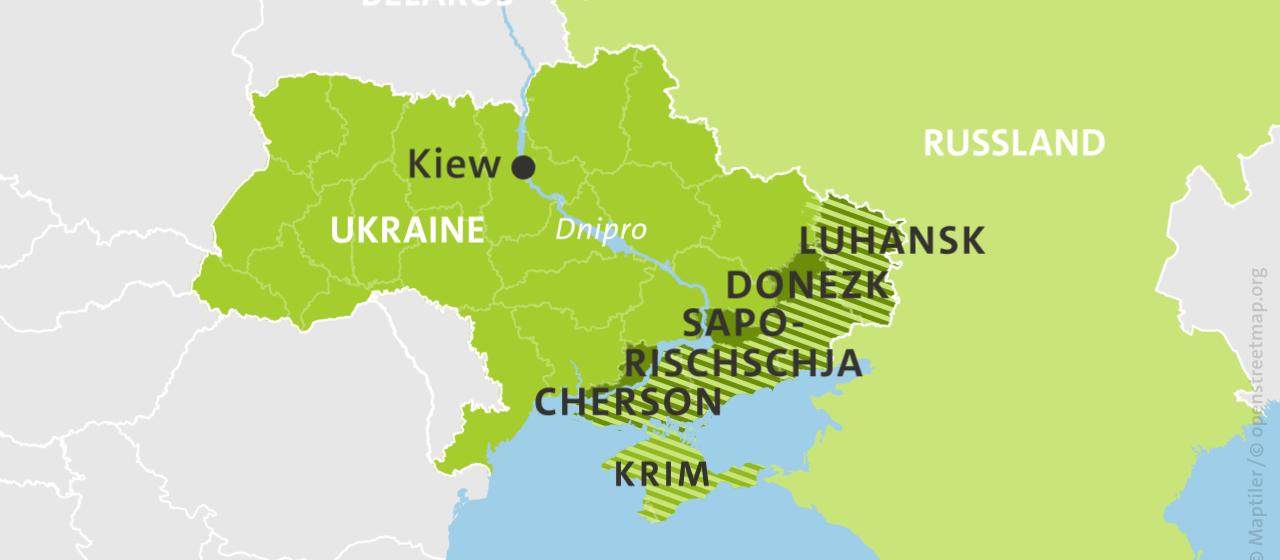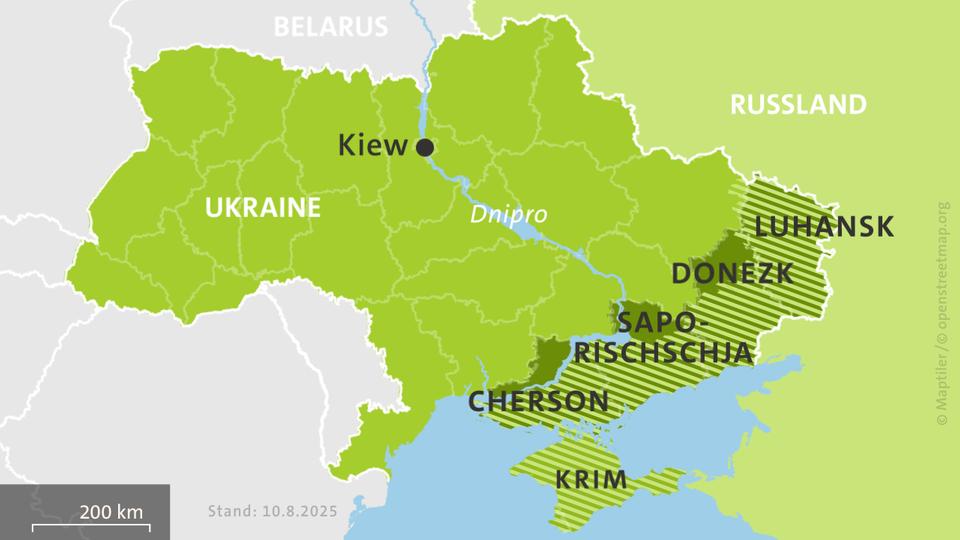
background
There will likely be a "swap of territory" between Russia and Ukraine, said US President Trump, referring to his meeting with Putin. Could Ukraine be forced to do this? International law has a clear answer.
Back in April of this year, US President Donald Trump announced that he had largely reached agreement with Russia on a peace agreement. At the time, the US president said the agreement stipulated that the Crimean peninsula, which Russia had annexed, would belong to Russia.
"A decision by Russia and the US over Ukraine's head is legally unthinkable, even if it may be becoming increasingly likely politically," says Pierre Thielbörger, professor of international law at Ruhr University Bochum. Such a peace agreement could not be possible without Ukraine's consent. Modern international law is based on the"sovereign equality of all states." Two states cannot simply enter into treaties to the detriment of a third.
A deal on territorial cessions by Ukraine without its consent clearly violates the country's territorial sovereignty, Thielbörger emphasizes. Furthermore, such a treaty between Russia and the US"would, based on its content, likely also violate the prohibition of the use of force and would therefore likely be contrary to international law," the international law expert said.
Occupied territories belong to Ukraine under international law
The Crimean peninsula and the four administrative districts of Luhansk, Donetsk, Zaporizhia, and Kherson belong to Ukraine under international law. The fact that Russia exercises de facto control over these territories—or at least parts of them—and has annexed them does not change this.
In 2014, there were referendums in Crimea and in 2022 in eastern and southern Ukraine on the accession of the occupied territories to Russia. However, international law experts consider these referendums to be sham votes. There are clear requirements for such referendums to be recognized under international law.
"For example, it must be guaranteed that voters can express their opinions freely, without coercion, and without fear," says Thielbörger. This was certainly not the case in 2014 during Russia's ongoing occupation of Crimea. Moreover, the votes in eastern and southern Ukraine in September 2022 already took place under the conditions of the Russian war of aggression and Russian occupation of the territories.

Previous votes were contrary to international law
As recently as July 2025, the European Court of Human Rights in Strasbourg found that Russia had already established a"system of human rights violations" in the occupied territories between 2014 and 2022. According to the ECHR ruling, these violations included indiscriminate military attacks, executions of civilians and Ukrainian military personnel, torture and expulsion, as well as the"suppression of the Ukrainian language in schools." Given this situation in the Russian-occupied regions, it cannot be assumed that the referendums there were in accordance with international law.
The UN General Assembly has repeatedly confirmed that the referendums in Crimea and eastern and southern Ukraine were illegal. They would not change the fact that these territories remain part of Ukraine. Law Professor Thielbörger also points out that in 2003, an international treaty was signed between Ukraine and Russia, in which Russia recognized Crimea as part of Ukraine. In 1997, the two states also pledged to respect each other's borders.
Russia invokes the right of self-determination of peoples
Russia repeatedly claims that the people of Crimea and the eastern and southern regions want to leave Ukraine, and that this is also enshrined in an important principle of international law, namely the right of peoples to self-determination. However, international law is very cautious on the question of whether a people's right to self-determination also gives them the right to secede from the motherland through a valid referendum, Thielbörger explains.
In principle, the right of self-determination allows peoples to freely determine their political, economic, and cultural development. It originated in the 19th century and developed primarily as former colonial states fought for their independence. However, this principle must always be balanced with another principle of international law, namely state sovereignty over one's own territory. Both principles can come into conflict if a population group seeks secession and the state objects.
Separation of a territory has high legal hurdles
According to Thielbörger, under international law, a distinction must be made between"internal" and "external" self-determination."Internal" self-determination means that national minorities receive special protection within the parent state, for example, self-government or protection of their culture and traditions.
"External" self-determination, i.e., secession from the parent state, is only possible under extreme circumstances. A people must be systematically oppressed and suffer severe human rights violations to be allowed to secede. In the case of Crimea and eastern and southern Ukraine, however, such serious violations of rights by the Ukrainian government did not occur.
Could Ukraine voluntarily give up the occupied territories?
What if Trump and Putin make a deal that stipulates Ukraine's ceding of the occupied territories, and the Ukrainian government reluctantly agrees? Would this price for peace be permissible under international law?"In principle, yes," says Thielbörger. However, consent to such a peace agreement would have to be"a lawful and, above all, voluntary act of the Ukrainian government." In particular, it must not be done under duress or the threat of force.
From the international law expert's perspective, it is"highly questionable what a coercive or voluntary decision by the Ukrainian government could look like in the current situation." It is currently difficult to say exactly how the situation in Ukraine would have to develop for one to speak of voluntary territorial cessions under international law. The heavy Russian airstrikes on civilian targets in recent months and the US government's threats to completely cut off military aid do not, in any case, suggest a situation in which the government of Ukrainian President Volodymyr Zelenskyy can act of its own free will.
Thielbörger points out another aspect: When making decisions about a state's territorial integrity, the role of the affected population must also be considered. There are different opinions on this in international law. Some international lawyers believe that the affected populations must also consent to the renunciation of national territory.
The Ukrainian Constitution also sets out requirements
If the territory of Ukraine is to be changed, the Ukrainian Constitution explicitly provides for a referendum in which all eligible Ukrainians can participate.
Furthermore, the constitution itself would likely have to be amended for the cession of the territories occupied by Russia. Article 133, Paragraph 2 defines the territory of Ukraine and explicitly lists the four regions of Luhansk, Donetsk, Zaporizhia, and Kherson. While the legal situation in Ukraine does not play a decisive role under international law, politically, Ukrainian constitutional law is likely to be important for any peace settlement.

